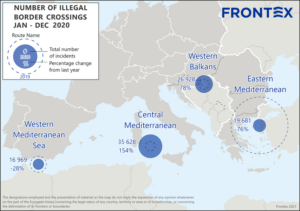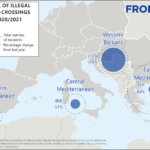The number of detections of illegal border crossings along the EU’s external borders fell 13% last year to around 124 000, in large part due to the impact of COVID-19 restrictions put in place by various countries, according to preliminary figures collected by Frontex. This was the lowest number of illegal border crossings since 2013.
Syrians remained the most frequently reported nationality in 2020, followed by Moroccans, Tunisians and Algerians.
Despite a rise early in the year, the Eastern Mediterranean migratory route ultimately saw the biggest fall in the number of arrivals, which fell by over three-quarters to around 20 000. The number of illegal border crossings in the Western Mediterranean region decreased by 29% to around 17 000.
Meanwhile, the Canary Islands experienced a record number of arrivals of migrants on its shores in 2020, mainly because of a significant increase in the last four months of the year. In total, more than 22 600 illegal border crossings were detected on the Western African migratory route, eight times the tally from the previous year. This was the highest number since Frontex began to collect data in 2009. Smugglers often used large fishing vessels capable of carrying a larger number of people that departed from West African countries such as Mauritania, Senegal and the Gambia.
More migrants also took the Central Mediterranean route. Despite the stark increase in departures from Tunisia, slightly more irregular migrants detected on this route had departed from Libya. In total, the number of irregular arrivals in the Central Mediterranean almost tripled to over 35 600, making it the most active migratory route into Europe.







Leave a Reply